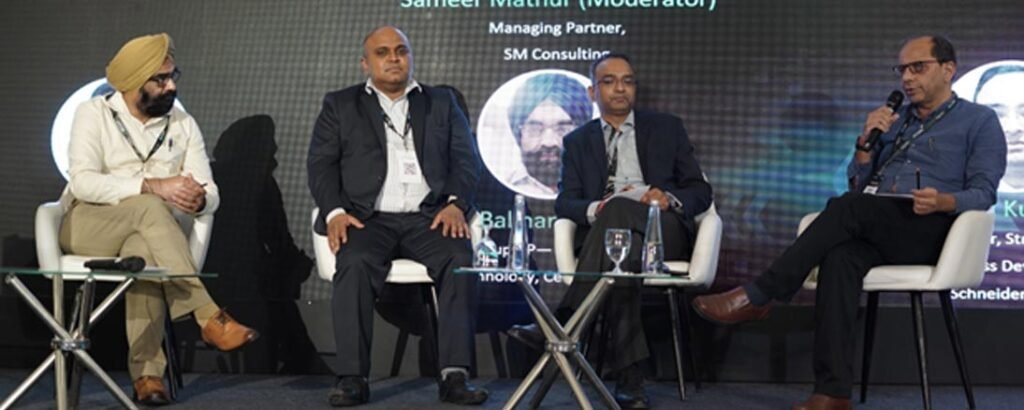A panel discussion at Xcelerate 2024 in Delhi organized by Schneider Electric and CMR delved into the complexities and opportunities of digital transformation for SMEs. Industry experts Anuj Kudesia Director of Strategy and Business Development, Schneider Electric; Balihar Singh Virk, Group VP – Information Technology, Centre for Sight; Sameer Mathur, Managing Partner – SM Consulting; and Rahul Bisen, GM – Schneider Electric offered insights into the challenges and strategies for successful digital adoption.

The discussion commenced with a fundamental question: What constitutes digital transformation? Sameer Mathur emphasized the varied interpretations among SMEs, ranging from ERP implementation to data centre establishment. Balihar Singh Virk, with a healthcare background, highlighted the importance of patient and doctor experience, emphasizing the need for omnichannel access and seamless information sharing.
A key theme emerging from the discussion was the importance of aligning digital transformation initiatives with business goals. As Anuj Kudesia pointed out, “Digital innovation should either increase customer experience or improve product efficiency.” This perspective underscores the need for a clear understanding of business objectives before embarking on any digital transformation journey.
Infrastructure was identified as a critical component of successful digital transformation. While acknowledging the significance of robust infrastructure, the panel emphasized the need for a balanced approach. “A strong robust infrastructure is essential for the success of any digital infrastructure,” said Anuj Kudesia. However, Balihar Singh Virk cautioned against excessive spending on infrastructure at the expense of other critical areas. “We have to understand that in lot of users in our healthcare scenario are the doctors whose primary job is to evaluate the patient not to use the computers,” he stated, highlighting the importance of user-centric design.
The discussion also touched upon the challenges posed by cyber security, with the recent introduction of the DPDPA Act in India being a focal point. The panel agreed on the need for robust security measures to protect sensitive data. As Anuj Kudesia emphasized, “People who have cyber security threat, they would not like to go into something which is cloud.”
The panel concluded by emphasizing the importance of a holistic approach to digital transformation, involving careful planning, stakeholder engagement, and a focus on business outcomes. By addressing the specific needs and challenges of SMEs, organizations can successfully leverage digital technologies to drive growth and efficiency.
Key Quotes:
- “Digital transformation starts from organization to organization as per their needs because as you said that there So for someone there is a need for a data centre for someone their need in the customer experience for someone their need in profitability and Productivity, so it depends on the Business need to what they are focusing on and what is the key factor which they are trying to achieve?” – Sameer Mathur
- “So if we talk about digital innovation as I am from the healthcare Background I’ll be talking about that. So in simple basically there are two Stakeholders mean two stakeholders in the healthcare environment. One is the patient second is the doctor.” – Balihar Singh Virk
- “So the cost of a good infrastructure is five lakh not so good is three lakh. So my question to the esteemed panel members here is how do you what challenges do you face in kind of convincing the key stakeholders in terms of investing in a robust infrastructure where the cost difference between a not-so-good infrastructure and an average infrastructure is there but considering the total cost it is maybe 1% of the total cost How do you take care of this challenge in terms of getting approvals for financial spending?” – Sameer Mathur
The panel discussion provided valuable insights into the complexities and opportunities of digital transformation for SMEs. By addressing the concerns and challenges faced by businesses, the panellists offered practical guidance for navigating the digital landscape.
To gain a deeper understanding of the implications of digital transformation, further exploration is needed in several areas. These include the role of emerging technologies like artificial intelligence and blockchain, the impact of digital transformation on job markets and workforce skills, and the ethical implications of data management and privacy.
Watch the full session here: https://youtu.be/EYwNVfn-ATI









